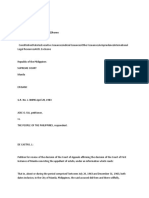0 ratings0% found this document useful (0 votes)
132 viewsRule 105
Rule 105
Uploaded by
ramszlai1. Voluntary acknowledgment of natural children made in a public instrument is enforceable even without judicial approval, as the approval is meant to benefit the minor child and can be waived by them.
2. Judicial approval of voluntary recognition is only needed if the recognition of a minor child occurs through an authentic document or statement in court, not a birth record or will. A minor child can also later ratify the recognition after reaching majority.
3. Voluntary recognition by both parents, through sworn testimony in court by the mother and a court judgment for the father, qualifies as a new means of recognition under the Civil Code and does not require judicial approval.
Copyright:
© All Rights Reserved
Available Formats
Download as DOC, PDF, TXT or read online from Scribd
Rule 105
Rule 105
Uploaded by
ramszlai0 ratings0% found this document useful (0 votes)
132 views3 pages1. Voluntary acknowledgment of natural children made in a public instrument is enforceable even without judicial approval, as the approval is meant to benefit the minor child and can be waived by them.
2. Judicial approval of voluntary recognition is only needed if the recognition of a minor child occurs through an authentic document or statement in court, not a birth record or will. A minor child can also later ratify the recognition after reaching majority.
3. Voluntary recognition by both parents, through sworn testimony in court by the mother and a court judgment for the father, qualifies as a new means of recognition under the Civil Code and does not require judicial approval.
Original Description:
rule 105
Copyright
© © All Rights Reserved
Available Formats
DOC, PDF, TXT or read online from Scribd
Share this document
Did you find this document useful?
Is this content inappropriate?
1. Voluntary acknowledgment of natural children made in a public instrument is enforceable even without judicial approval, as the approval is meant to benefit the minor child and can be waived by them.
2. Judicial approval of voluntary recognition is only needed if the recognition of a minor child occurs through an authentic document or statement in court, not a birth record or will. A minor child can also later ratify the recognition after reaching majority.
3. Voluntary recognition by both parents, through sworn testimony in court by the mother and a court judgment for the father, qualifies as a new means of recognition under the Civil Code and does not require judicial approval.
Copyright:
© All Rights Reserved
Available Formats
Download as DOC, PDF, TXT or read online from Scribd
Download as doc, pdf, or txt
0 ratings0% found this document useful (0 votes)
132 views3 pagesRule 105
Rule 105
Uploaded by
ramszlai1. Voluntary acknowledgment of natural children made in a public instrument is enforceable even without judicial approval, as the approval is meant to benefit the minor child and can be waived by them.
2. Judicial approval of voluntary recognition is only needed if the recognition of a minor child occurs through an authentic document or statement in court, not a birth record or will. A minor child can also later ratify the recognition after reaching majority.
3. Voluntary recognition by both parents, through sworn testimony in court by the mother and a court judgment for the father, qualifies as a new means of recognition under the Civil Code and does not require judicial approval.
Copyright:
© All Rights Reserved
Available Formats
Download as DOC, PDF, TXT or read online from Scribd
Download as doc, pdf, or txt
You are on page 1of 3
SPECIAL PROCEEDING
Submitted by
Mika Abigail G. Lee
RULE 105
JUDICIAL APPROVAL OF VOLUNTARY RECOGNITION OF MINOR
CHILDREN
1. JESUS GUARIA vs. AGUEDA GUARIA-CASAS
G.R. No. L-15707. October 31, 1960
Voluntary acknowledgment of natural children made in a public
instrument is enforceable even if the instrument is not approved by the
Court. The judicial approval of the instrument is meant for the benefit
of the minor which the latter may raise of waive.
2. LIGAYA GAPUSAN-CHUA vs. COURT OF APPEALS
G.R. No. 46746. March 15, 1990
a. Recognition of natural children may be voluntary or compulsory.
Voluntary recognition, it has been said, "is an admission of the fact of
paternity or maternity by the presumed parent, expressed in the form
prescribed by the Civil Code. Its essence lies in the avowal of the
parent that the child is his; the formality is added to make the
admission incontestable, in view of its consequences." The form is
prescribed by Article 278 of the Civil Code, earlier adverted to; it
provides that a voluntary recognition "shall be made in the record of
birth, a will, a statement before a court of record, or in any authentic
writing." Compulsory recognition is sometimes also called judicial
recognition, to distinguish it from that which is a purely voluntary act of
the parent. It is recognition decreed by final judgment of a competent
court. It is governed by Articles 283 and 284, setting forth the cases in
which the father or mother, respectively, is obliged to recognize a
natural child, and Article 285, providing that generally, the action for
recognition of natural children may be brought only during the lifetime
of the presumed parents.
b. The matter of whether or not judicial approval is needful for the
efficacy of voluntary recognition is dealt with in Article 281 of the Civil
Code. ART. 281. A child who is of age cannot be recognized without his
consent. When the recognition of a minor does not take place in a
record of birth or in a will, judicial approval shall be necessary. A minor
can in any case impugn the recognition within four years following the
attainment of his majority. In other words, judicial approval is not
needed if a recognition is voluntarily made 1) of a person who is of
age, only his consent being necessary; or 2) of a minor whose
acknowledgment is effected in a record of birth or in a will. It is
admitted on all sides that no judicial action or proceeding was ever
brought during the lifetime of Felisa to compel her to recognize Ligaya
as her daughter. It is also evident that Ligaya's recognition as Felisa's
daughter was not made in a record of birth or a will, a circumstance
which would have made judicial approval unnecessary, only her own
consent to the recognition being required. The acknowledgment was
made in authentic writings, and hence, conformably with the legal
provisions above cited, judicial approval thereof was needed if the
writings had been executed during Ligaya's minority. In other words,
the question of whether or not the absence of judicial approval
negated the effect of the writings as a mode of recognition of Ligaya is
dependent upon the latter's age at the time the writings were made.
c. Judicial approval is needful if the recognition of the minor is effected,
not through a record of birth or in a will but through a statement in a
court of record or an authentic document. In any case the individual
recognized can impugn the recognition within four years
d. The consent required by Article 281 of a person of age who has been
voluntarily recognized may be given expressly or tacitly. Assuming
then that Ligaya was of age at the time of her voluntary recognition,
the evidence shows that she has in fact consented thereto. Her
consent to her recognition is not only implicit from her failure to
impugn it at any time before her mother's death, but is made clearly
manifest and conclusive by her assertion of that recognition in the
judicial proceeding for the settlement of her mother's estate as basis
for her rights thereto. Assuming on the other hand, that she was a
minor at the time of her recognition, and therefore judicial approval of
the recognition was necessary, the absence thereof was cured by her
ratification of that recognition, after having reached the age of
majority, by her initiation of the proceedings for the settlement of her
deceased mother's estate on the claim precisely that she was the
decedent's acknowledged natural daughter.
e. The requirement of judicial approval imposed by Article 281 is
clearly intended for the benefit of the minor. "The lack of judicial
approval can not impede the effectivity of the acknowledgment made.
The judicial approval is for the protection of the minor against any
acknowledgment made to his prejudice." "Therefore, the lack or
insufficiency of such approval is NOT a defect available to the
recognizing parent but one which the minor may raise or waive. If after
reaching majority the minor consents to the acknowledgment, the lack
of judicial approval should make no difference. Implied consent to the
acknowledgment may be shown (e.g.,) by such acts as keeping, even
after reaching the age of majority, the acknowledgment papers and
the use of the parent's surname.
3. MAXIMINO A. GARCIA vs. PATROCINIO PONGAN
G.R. No. L-4362 August 31, 1951.]
But in the present case, not only the appellant father, but also the
respondent mother have recognized the minor child, the former by
judgment of the court, and the latter by voluntarily testifying or stating
under oath before the Court of First Instance in this case, that said
child is her natural child, which is a new means of voluntary
recognition of a natural child by his father or mother under article 278
of the new Civil Code, which says the "Recognition shall be made in the
record or in any authentic writing." Such voluntary recognition does not
require judicial approval according to article 281 of the same Code.
4. CONCHA C. APACIBLE and ESPERANZA AGUILAR vs. MARIA
CASTILLO
G.R. No. 49041. March 20, 1944
1. It is also contended that the mere admission of paternity made by
Vicente Castillo in the certificate of birth without expressly stating
therein that he recognized the child as his natural daughter, is not
sufficient; in other words, that the acknowledgment must be made
expressly and not incidentally. This same contention has also been
decided by us adversely to the petitioners in the case of Javelona vs.
Monteclaro, G. R. No. 48464 (promulgated October 4, 1943).
2. We hold that altho the second paragraph of article 133 of the Civil
Code is still in force and the court's approval of the acknowledgment of
a minor child may be obtained thereunder, the lack of such approval
may be supplied by the child's consent given after reaching majority,
and that in the present case such consent was given by Maria Castillo
not only by continuing to accept the status of an acknowledged natural
daughter of Vicente Castillo after she had reached majority but also by
expressly petitioning the court to consider her as such and to allow her
to intervene in his intestacy as an heir of his.
You might also like
- Affidavit of Explanation (DFA)Document2 pagesAffidavit of Explanation (DFA)Apple Joy Collados100% (5)
- Sample Declaration of Compliance With Meet and Confer Requirement For Judgment On The Pleadings in CaliforniaDocument5 pagesSample Declaration of Compliance With Meet and Confer Requirement For Judgment On The Pleadings in CaliforniaStan BurmanNo ratings yet
- Rule 104-108 Dssolution of Corp, Family Home, Absentees, Change Correction of Entries in Birth CertDocument38 pagesRule 104-108 Dssolution of Corp, Family Home, Absentees, Change Correction of Entries in Birth CertNinja ChihuahuaNo ratings yet
- Purpose of Summons in Action in Rem and Quasi in RemDocument4 pagesPurpose of Summons in Action in Rem and Quasi in Remjane100% (2)
- Case 2: Vs - Sandiganbayan (Fourth Division), Jose LDocument3 pagesCase 2: Vs - Sandiganbayan (Fourth Division), Jose Lidmu bcpo100% (1)
- Jonathan Simon Governing Through CrimeDocument4 pagesJonathan Simon Governing Through CrimeChristianNo ratings yet
- Rule 101, Rule 105 Special ProceedingsDocument4 pagesRule 101, Rule 105 Special ProceedingsIan Joshua RomasantaNo ratings yet
- DIGESTDocument2 pagesDIGESTKherry LoNo ratings yet
- 2004 Rules On Notarial PracticeDocument8 pages2004 Rules On Notarial PracticeMaryStefanieNo ratings yet
- Rule 105Document25 pagesRule 105Gillian Alexis ColegadoNo ratings yet
- Labor Law - ReviewerDocument9 pagesLabor Law - ReviewerNoel Christopher G. BellezaNo ratings yet
- People Vs KintanarDocument3 pagesPeople Vs KintanarMiaNo ratings yet
- Sample ComplaintDocument6 pagesSample ComplaintFrancess Mae AlonzoNo ratings yet
- BusOrg Partnership Case CompilationDocument87 pagesBusOrg Partnership Case CompilationpandaNo ratings yet
- Processual PresumptionDocument1 pageProcessual PresumptionRuben Ayson Jr100% (1)
- Cases Reformation and InterpretationDocument53 pagesCases Reformation and InterpretationAnthony John ApuraNo ratings yet
- dISPUTABLE PRESUMPTIONSDocument2 pagesdISPUTABLE PRESUMPTIONSahleksieNo ratings yet
- FORM NO. 60 Simple Form of Sale of Personal PropertyDocument1 pageFORM NO. 60 Simple Form of Sale of Personal PropertyAlexandrius Van VailocesNo ratings yet
- Jurisdictional Requirement For AdoptionDocument2 pagesJurisdictional Requirement For AdoptionBoletPascuaNo ratings yet
- BBCCC SpaDocument2 pagesBBCCC SpaRonic TreptorNo ratings yet
- Computation of Life Expectancy - DamagesDocument2 pagesComputation of Life Expectancy - DamagesKC ToraynoNo ratings yet
- Canezo vs. RoxasDocument9 pagesCanezo vs. RoxasMarites regaliaNo ratings yet
- Admin ElectDocument27 pagesAdmin ElectMiji HarunoNo ratings yet
- BAr QuestionsDocument2 pagesBAr QuestionsAlder AbadinasNo ratings yet
- Land Titles and Deeds ReportDocument10 pagesLand Titles and Deeds ReportBrent TorresNo ratings yet
- The 2011 NLRC Rules of ProcedureDocument41 pagesThe 2011 NLRC Rules of ProcedureRonna YapNo ratings yet
- Application For CBA Registration (BLR Form No. 10-CBA, S 2003)Document3 pagesApplication For CBA Registration (BLR Form No. 10-CBA, S 2003)Alvin John BalagbagNo ratings yet
- Distinguish Domestic Adoption From Inter-Country AdoptionDocument6 pagesDistinguish Domestic Adoption From Inter-Country AdoptionKathNo ratings yet
- The Scope of Application of The Right To A Fair Trial in Criminal MattersDocument30 pagesThe Scope of Application of The Right To A Fair Trial in Criminal MattersOrland Marc LuminariasNo ratings yet
- Ipso Facto Void Without Need of Any Judicial Declaration ofDocument5 pagesIpso Facto Void Without Need of Any Judicial Declaration ofRobinson MojicaNo ratings yet
- Donor's Tax-2Document36 pagesDonor's Tax-2Razel Mhin MendozaNo ratings yet
- Legal Forms - Content SyllabusDocument7 pagesLegal Forms - Content SyllabusJa CinthNo ratings yet
- Maralit Case DigestDocument1 pageMaralit Case DigestKim Andaya-YapNo ratings yet
- PALE - Affinity and Consanguinity As A Basis For Disqualification Under Canon 3 Section 5Document5 pagesPALE - Affinity and Consanguinity As A Basis For Disqualification Under Canon 3 Section 5Federico Dipay Jr.No ratings yet
- Law On PartnershipDocument23 pagesLaw On Partnershipdempearl2315No ratings yet
- Data Privacy ActDocument9 pagesData Privacy Actkarla126No ratings yet
- Ppsa Lecture - CJ TanDocument17 pagesPpsa Lecture - CJ TanTzu MinminNo ratings yet
- List of Accredited Appeals Court MediatorsDocument12 pagesList of Accredited Appeals Court MediatorsAnonymous 5bCCnTzScCNo ratings yet
- Villavicencio vs. Lukban., 39 Phil., 778, No. 14639 March 25, 1919Document8 pagesVillavicencio vs. Lukban., 39 Phil., 778, No. 14639 March 25, 1919Jin AghamNo ratings yet
- Asiavest Limited V CADocument3 pagesAsiavest Limited V CAyousirneighmNo ratings yet
- Esguerra ReviewerDocument122 pagesEsguerra ReviewerHency TanbengcoNo ratings yet
- N - Doctrine of Privilege Communications in PleadingsDocument50 pagesN - Doctrine of Privilege Communications in Pleadingssigfridmonte100% (1)
- 100 Manuel Labor Notes PDFDocument20 pages100 Manuel Labor Notes PDFTopnotch2015No ratings yet
- 1992 People - v. - Sandiganbayan20210424 14 170b42uDocument8 pages1992 People - v. - Sandiganbayan20210424 14 170b42uMichael JovankiiNo ratings yet
- People v. Court of AppealsDocument2 pagesPeople v. Court of AppealsadeeNo ratings yet
- Poea RulesDocument23 pagesPoea RulesSuiNo ratings yet
- Speedy DispositionDocument8 pagesSpeedy Dispositionromeo n bartolomeNo ratings yet
- The Constitutional Ban On Land Acquisition by Aliens PDFDocument16 pagesThe Constitutional Ban On Land Acquisition by Aliens PDFPatrick ManaloNo ratings yet
- Memorandum of Agreement: Know All Men by These PresentsDocument3 pagesMemorandum of Agreement: Know All Men by These PresentsMarylou Pereda MiramNo ratings yet
- Islamic Law of SuccessionDocument77 pagesIslamic Law of SuccessionMohandas PeriyasamyNo ratings yet
- Judicial Recognition of Foreign Divorce PDFDocument2 pagesJudicial Recognition of Foreign Divorce PDFVeronica Alon-GloriaNo ratings yet
- Gerandoy, Jingle Merry G. Legal Forms Midterm Exam JD3: AdditionDocument11 pagesGerandoy, Jingle Merry G. Legal Forms Midterm Exam JD3: AdditionJing Goal MeritNo ratings yet
- FFinal Examination 1Document2 pagesFFinal Examination 1Nhazz PasandalannNo ratings yet
- Legal Forms (Ateneo)Document54 pagesLegal Forms (Ateneo)Charles DBNo ratings yet
- Hospitalization of The InsaneDocument1 pageHospitalization of The InsaneAyumi Xuie MontefalcoNo ratings yet
- HISTORY of Philippine Association of Court InterpretersDocument3 pagesHISTORY of Philippine Association of Court InterpretersArvin Paez EugenioNo ratings yet
- Sample ReplevinDocument4 pagesSample ReplevinLee SomarNo ratings yet
- Contract of Lease of Personal PropertyDocument3 pagesContract of Lease of Personal PropertyMa. Fabiana GarciaNo ratings yet
- Portugal V IACDocument1 pagePortugal V IACJoshua PielagoNo ratings yet
- Puyat v. Zabarte 352 SCRA 738Document11 pagesPuyat v. Zabarte 352 SCRA 738Trebx Sanchez de GuzmanNo ratings yet
- Rodriguez vs. CaDocument5 pagesRodriguez vs. CaJemika Kathryn Soledad-TecsonNo ratings yet
- Rodriguez v. CA, GR 85723Document6 pagesRodriguez v. CA, GR 85723Anna NicerioNo ratings yet
- LIGAYA GAPUSAN-CHUA V COURT OF APPEALS AND PROSPERO PARCONDocument2 pagesLIGAYA GAPUSAN-CHUA V COURT OF APPEALS AND PROSPERO PARCONKim RamosNo ratings yet
- Estafa Case LiabilityDocument14 pagesEstafa Case LiabilityramszlaiNo ratings yet
- AffidavitDocument1 pageAffidavitramszlaiNo ratings yet
- Global SustainabilityDocument21 pagesGlobal Sustainabilityramszlai100% (1)
- DEED OF UNDERTAKINg2Document1 pageDEED OF UNDERTAKINg2ramszlaiNo ratings yet
- Nial V BayadogDocument4 pagesNial V BayadogramszlaiNo ratings yet
- TalkHang Event PrimerDocument1 pageTalkHang Event PrimerramszlaiNo ratings yet
- TalkHang Program PDFDocument1 pageTalkHang Program PDFramszlaiNo ratings yet
- TalkHang Event PrimerDocument1 pageTalkHang Event PrimerramszlaiNo ratings yet
- Creative Reaction PaperDocument1 pageCreative Reaction PaperramszlaiNo ratings yet
- Anti HazingDocument3 pagesAnti HazingramszlaiNo ratings yet
- 4 Nutrition in InfancyDocument92 pages4 Nutrition in InfancyramszlaiNo ratings yet
- For Bidding DecDocument20 pagesFor Bidding DecramszlaiNo ratings yet
- Invitation To Bid: General GuidelinesDocument17 pagesInvitation To Bid: General GuidelinesramszlaiNo ratings yet
- Digest Rr12 10Document1 pageDigest Rr12 10ramszlaiNo ratings yet
- Pag Ibig BiddngDocument16 pagesPag Ibig BiddngramszlaiNo ratings yet
- Request For Customer Number: Address ToDocument3 pagesRequest For Customer Number: Address ToAkhilesh GuptaNo ratings yet
- Cojuangco, Jr. Vs Roxas Case DigestDocument2 pagesCojuangco, Jr. Vs Roxas Case DigestRaje Paul ArtuzNo ratings yet
- G.R. No. L-22320Document3 pagesG.R. No. L-22320Kyle AgustinNo ratings yet
- Jurisdiction of Courts TableDocument7 pagesJurisdiction of Courts TableEllen DebutonNo ratings yet
- Hermosilla v. Coca-Cola (11th Cir. Mar. 25, 2011)Document5 pagesHermosilla v. Coca-Cola (11th Cir. Mar. 25, 2011)Andrew PequignotNo ratings yet
- 05 Narra Nickel Mining and Development Corp. vs. Redmont Consolidated Mines Corp. (2015) RESOLUTIONDocument4 pages05 Narra Nickel Mining and Development Corp. vs. Redmont Consolidated Mines Corp. (2015) RESOLUTIONRalph Deric EspirituNo ratings yet
- Pelindungan Privacy Dan Personal Data: Dr. Edmon Makarim, S.Kom., S.H., LL.MDocument20 pagesPelindungan Privacy Dan Personal Data: Dr. Edmon Makarim, S.Kom., S.H., LL.MDamarani BangwolNo ratings yet
- Appendix ContractDocument2 pagesAppendix ContractDianNo ratings yet
- Tim Houston To Hon. Joseph P. Kennedy July 31, 2020Document3 pagesTim Houston To Hon. Joseph P. Kennedy July 31, 2020Chronicle HeraldNo ratings yet
- Gerona Vs de Guzman - G.R. No. L-19060. May 20, 1964Document3 pagesGerona Vs de Guzman - G.R. No. L-19060. May 20, 1964Ebbe DyNo ratings yet
- Affidavit of Desistance: "People of The Philippines vs. Narcisco B. Natividad" For Grave ThreatsDocument2 pagesAffidavit of Desistance: "People of The Philippines vs. Narcisco B. Natividad" For Grave ThreatsIsidore Tarol IIINo ratings yet
- Summary of Lokpal & Lokayukta BillDocument1 pageSummary of Lokpal & Lokayukta Billadi_vijNo ratings yet
- Search and Seizure and ArrestDocument14 pagesSearch and Seizure and ArrestJoan Frances SalesNo ratings yet
- Company Law in ContextDocument5 pagesCompany Law in ContextpareezarehhmanNo ratings yet
- SpecPro Rules 78-83Document27 pagesSpecPro Rules 78-83BananaNo ratings yet
- CREDTRANS LBP Vs POBLETE RecitDocument2 pagesCREDTRANS LBP Vs POBLETE RecitJimenez LorenzNo ratings yet
- Notice Doc 217 - MAHAPREITDocument11 pagesNotice Doc 217 - MAHAPREITRahul PurshottamNo ratings yet
- Fuller v. Johannessen, 76 F.3d 347, 11th Cir. (1996)Document5 pagesFuller v. Johannessen, 76 F.3d 347, 11th Cir. (1996)Scribd Government DocsNo ratings yet
- Discharge of A Party or PartiesDocument2 pagesDischarge of A Party or PartiesHarini BNo ratings yet
- B LAW 341 Business Law I: Section 005 Introduction To Contracts, Liability Issues & Intellectual PropertyDocument19 pagesB LAW 341 Business Law I: Section 005 Introduction To Contracts, Liability Issues & Intellectual PropertyEmma WuNo ratings yet
- 6 13 13 0204 61383 Declaration of Coughlin Concernign Trespass Conviction and Hill's Sworn Testimony 13-17328Document384 pages6 13 13 0204 61383 Declaration of Coughlin Concernign Trespass Conviction and Hill's Sworn Testimony 13-17328DoTheMacaRenoNo ratings yet
- Copyright Case-Digest Set-1Document2 pagesCopyright Case-Digest Set-1Jay Kent RoilesNo ratings yet
- Evidence Act 1872Document5 pagesEvidence Act 1872Sudhir SachdevaNo ratings yet
- Institute of Chartered Secretaries of BangladeshDocument17 pagesInstitute of Chartered Secretaries of BangladeshMohammadOmarFaruqNo ratings yet
- The Conservative Party of New York State: Founded 1962Document8 pagesThe Conservative Party of New York State: Founded 1962cpnysNo ratings yet
- Appendix A-1Document1 pageAppendix A-1gmarchitectsNo ratings yet
- Paying PollutersDocument24 pagesPaying Pollutersak4410378No ratings yet







































































































